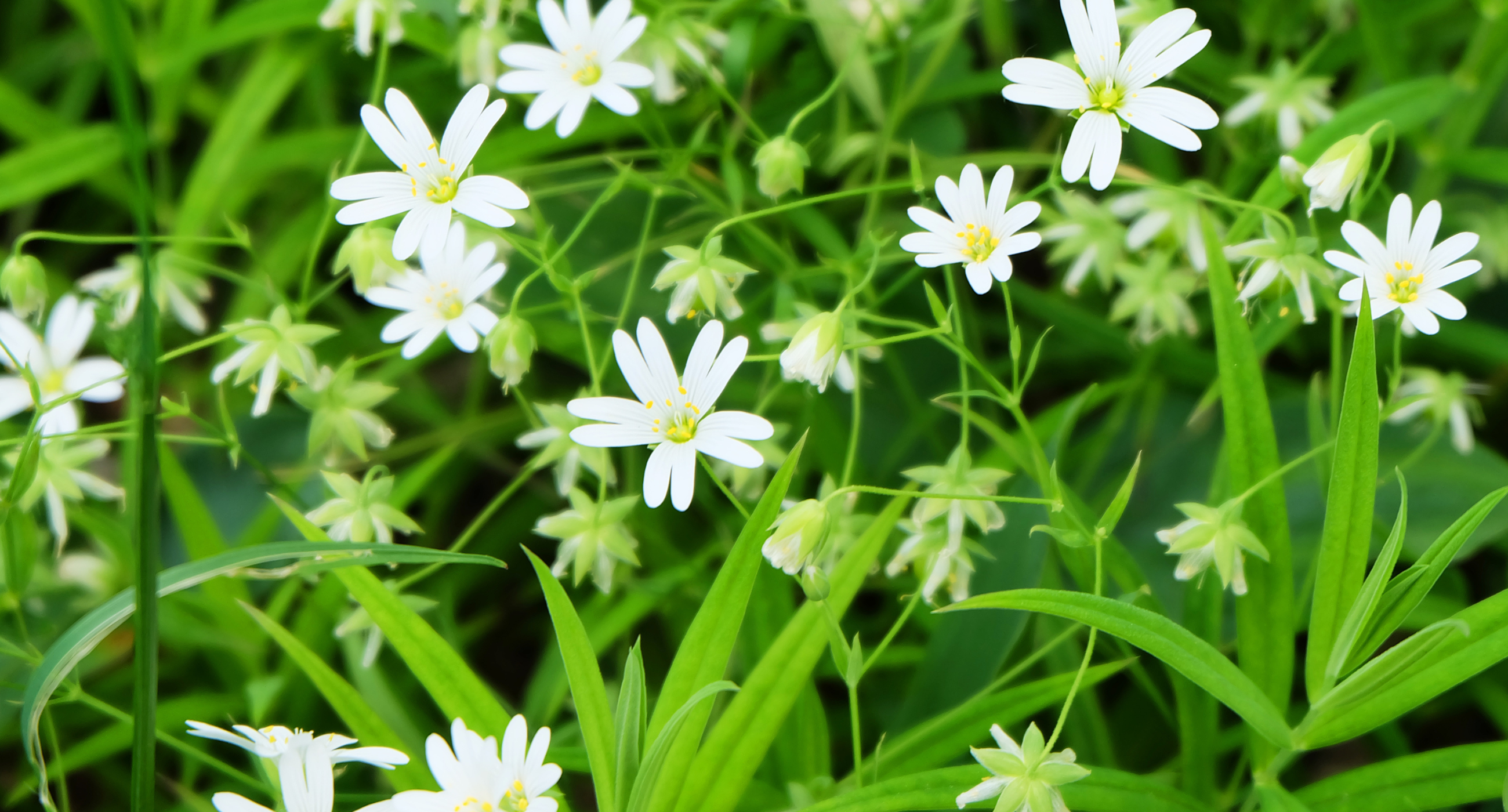
Chickweed
Scientific Name: Stellaria media
Herbal Profile of Chickweed (Stellaria media)
Common Name: Chickweed
Botanical Name: Stellaria media
Family: Caryophyllaceae (Pink family)
Description:
Chickweed is a low-growing annual or perennial herb commonly found in temperate regions worldwide. It thrives in moist, shady areas such as gardens, fields, and lawns. The plant is characterized by its small, star-shaped white flowers, paired leaves, and a line of fine hairs running along one side of the stem. Chickweed has long been used in herbal medicine for its soothing, cooling, and anti-inflammatory properties. It is both edible and medicinal, and is often used in salads, soups, or as a topical remedy for skin issues.
Key Constituents:
- Saponins: Provide anti-inflammatory, expectorant, and skin-soothing properties.
- Flavonoids (apigenin, quercetin): Antioxidants with anti-inflammatory and immune-boosting effects.
- Vitamin C: Enhances immune function and skin health.
- Vitamin A and B vitamins: Support overall health and metabolism.
- Minerals (calcium, magnesium, potassium): Contribute to bone health and electrolyte balance.
- Mucilage: Soothes irritated tissues, particularly in the digestive and respiratory tracts.
Medicinal Uses:
- Skin Health and Wound Healing:
- Anti-inflammatory and Pain Relief:
- Respiratory Health:
- Digestive Health and Weight Management:
- Cooling and Demulcent Properties:
- Immune Support:
Forms of Use:
- Tea or Infusion: Chickweed tea is commonly used for respiratory health, digestive complaints, and as a general tonic. The dried or fresh aerial parts of the plant are steeped in hot water to extract its beneficial compounds.
- Poultice or Compress: Fresh chickweed leaves can be mashed and applied directly to the skin as a poultice to reduce swelling, irritation, and inflammation. It is often used for wounds, burns, and rashes.
- Ointment or Salve: Chickweed-infused ointments or salves are used for topical applications to soothe skin conditions like eczema, rashes, or psoriasis.
- Tincture: Alcohol-based chickweed tinctures are used for concentrated, internal use, particularly for anti-inflammatory, digestive, and immune-supportive purposes.
- Fresh Edible: Chickweed is edible and often used in salads, soups, and green smoothies. It is high in vitamins and minerals, making it a nutritious addition to the diet.
Precautions:
- Allergic Reactions: Chickweed is generally considered safe, but some individuals may be allergic to it. Patch-testing is recommended before applying chickweed topically to ensure there is no allergic reaction.
- Pregnancy and Breastfeeding: While chickweed is generally safe for culinary use, its use during pregnancy and breastfeeding should be approached with caution in medicinal doses. Always consult a healthcare provider before use.
- Excessive Consumption: In large amounts, chickweed may cause mild gastrointestinal upset, especially in individuals with sensitive stomachs.
Growing and Harvesting:
- Climate: Chickweed thrives in temperate climates and prefers moist, nutrient-rich soils. It often grows as a "weed" in gardens, meadows, and forests. It is a hardy plant that can be found growing year-round in mild climates.
- Planting: Chickweed can be grown from seeds in early spring or fall. It prefers partial shade and can tolerate a variety of soil types. The plant grows low to the ground and spreads quickly, often forming a mat-like cover.
- Harvesting: The aerial parts (leaves, stems, flowers) are harvested throughout the growing season, ideally in early spring when the plant is young and tender. It is best used fresh for poultices, but it can also be dried for teas and infusions.
Traditional and Historical Uses:
- Folk Medicine: Chickweed has been used in European folk medicine for centuries to treat skin conditions, soothe inflamed tissues, and as a mild diuretic. It was often applied topically for burns, wounds, and rashes.
- Edible Uses: Chickweed has been consumed as a wild edible plant for centuries, prized for its mild flavor and high nutritional value. It has been used in salads, soups, and other culinary dishes.
Chickweed is a gentle, yet effective herb known for its cooling, soothing, and anti-inflammatory properties. It is widely used for skin conditions, respiratory health, and digestive support. With its versatility and safety for most people, chickweed is a valuable addition to the herbal medicine cabinet, particularly for minor skin irritations and inflammatory conditions.
